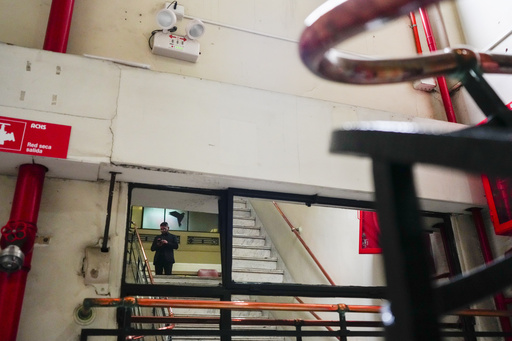
SANTIAGO, Chile — On Friday evenings in downtown Santiago, a group of 15 individuals gathers for a unique ritual. They share a bottle of wine amid the aromas of tobacco and incense, their voices mingling with the flickering light of black candles placed on an altar adorned with chalices and knives. This assembly is part of the Temple of Satan in Chile, aiming for legal recognition as a religious association in a traditionally conservative nation where almost half of the 18 million inhabitants identify as Catholic.
The call for official status comes five years after the Satanic Temple in the United States was designated as a church, a move that stirred public concern. Observers note that the Catholic Church, often a significant influence in public life, is currently facing a crisis of faith due to numerous sexual abuse scandals revealed over the years. “These organizations feel more empowered to challenge pre-existing norms that were previously unapproachable,” explains Luis Bahamondes, a professor at the University of Chile’s Center for Judaic Studies. He adds that the Catholic Church had dominated various spheres such as politics, economics, and education until recent times.
Describing itself as the Temple of Satan: Satanists and Luciferians of Chile, the organization does not engage in any form of sacrifice or devil worship. Its 100 members, which include publicists, firefighters, police officers, lawyers, and psychologists, have embraced the group as a way to question societal moral standards and religious constraints. While they adopt the label of Satanist, their belief system centers on rationality, individualism, and the enjoyment of life rather than a deity figure. Instead of veneration for gods, they express reverence for humanity.
“You control your destiny—no deity dictates your choices,” states Haborym, a spokesperson for the group, during a walk through Santiago’s General Cemetery. He emphasizes that the figure of Satan serves as a mere symbol for evoking emotional responses and setting aside intellectual considerations during their rituals.
Members of the Temple of Satan often choose to remain anonymous due to the nature of their public-facing jobs and the potential threats they face. Contrary to the dark imagery associated with Satanism in popular culture, such as in films like “Rosemary’s Baby” or series like “True Detective,” contemporary organizations like the Temple of Satan advocate against animal cruelty, reject any association with criminals, and view pleasure positively while remaining mostly reserved about their beliefs unless prompted.
“We don’t endorse violence in the name of Satan,” stresses Haborym. Those looking to join the Temple of Satan must complete a rigorous admission process which includes submitting an application, proving a clean criminal record, undergoing interviews, and passing a psychological evaluation. Accepted members are then given the opportunity to adopt a new name, typically inspired by a demon or fallen angel.
Established in 2021, the Temple of Satan in Chile has already seen over 400 applications in recent months, particularly following a formal request to the Ministry of Justice for legal recognition, which stoked significant media interest and prompted intense public debate among Chile’s religious communities. Leaders from the Catholic, Anglican, Jewish, and Evangelical churches collectively expressed concern, noting that the history of Satanism is often associated with negative events.
Reflecting a modern interpretation of Satanism that prizes skepticism over superstition, this group allows followers to develop their own beliefs and rituals. Many of its members identify as atheists, while others may practice witchcraft or explore magical concepts. Azazel, who founded the Temple after leaving Judaism, shares that certain academic and esoteric foundations inform their perspective on life and reality.
Inside the chamber where rituals occur, chants, clapping, and readings from the Satanic Bible create an atmosphere of unity and purpose. Newcomers range from those steeped in occult practices to individuals from various religious backgrounds, including Catholics, Jews, Protestants, and Evangelicals, all seeking fulfillment outside traditional religious constraints. “In our belief, absolute truths do not exist—you are your own god and creator of your reality,” explains Kali Ma, a dentistry student raised in a Jehovah’s Witness family.
Néstor da Costa, an expert in secularism, notes that the rise in individuals exploring alternative perspectives could reflect a shift toward less dogmatic belief systems. “It suggests a re-evaluation or readjustment for those leaving Catholicism while still seeking meaning,” he observes.
The future recognition of the Temple of Satan as a legitimate religious organization remains uncertain. However, their very presence has already ignited conversations previously considered taboo in Chile’s conservative landscape. In demanding official acknowledgment, the group embodies the rebellious spirit of Satanic philosophy against long-standing traditions. “We align with all requirements set for religious entities,” Haborym concludes. “Thus, any refusal would stem solely from our controversial nature.”
